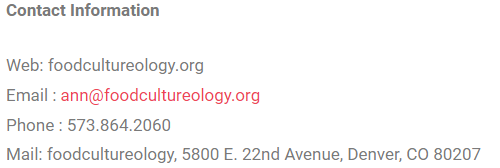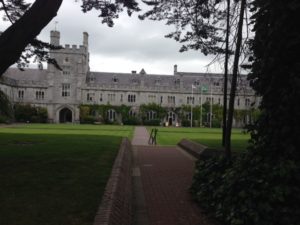Ireland 2025
Explore. Experience. Discover: The Food Culture of Ireland
A 10-day immersion to explore, experience and discover the beauty of the country and the passion of the people that creates the unique food culture of southwest Ireland. Based in Cork, the food and culinary capital of Ireland, the program begins on the historic University College Cork (UCC) campus in engaging discussions with UCC faculty Colin Sage, food geographer and author of Environment and Food and Regina Sexton, food and culinary historian and author of A Little History of Irish Food, setting the stage for the tours, tastings and experiences ahead. Colin and Regina will be our guides as we explore Cork’s renowned English Market and Butter Museum, travel to the nearby village of Midleton for the Saturday market, visit with farmers and seaweed foragers, and spend an afternoon at the internationally acclaimed Ballymaloe Cookery School where you will work with the culinary staff to prepare a garden to table dinner. The program provides a perfect mix of scheduled activities and meals and the opportunity to discover and visit local sites and restaurants on your own.
PROGRAMS
foodcultureology is offering two programs in Ireland in 2025.
May 27 – June 6
Tues May 27 | Arrive in Cork. Check into UCC accommodations
Wed May 28 | University College Cork orientation. Program overview.
Thurs May 29 | Food, Culinary, and Dietary Patterns in Ireland.
Fri May 30 | English Market. Farmgate. Butter Museum.
Sat May 31| Midleton Market. Frank Hedeman salmon smokery
Sun June 1 | Free day
Mon June 2 | History of Food in Ireland. Cobh Heritage Museum.
Tues June 3 | Fota House and Ballymaloe Cookery School.
Wed June 4 | Sustainability and Farming. Glenilen Dairy and Seaweed Foraging.
Thurs June 5 | Climate Impact on Animal Protein Production. Vegetable farm. Farewell dinner.
Fri June 6| Departure
Tuesday, May 27 | Arrive in Cork. Check into University College Cork accommodations.
Wednesday, May 28 | University College Cork
Colin Sage, PhD and Regina Sexton, MS
Welcome, campus tour and program overview. Lunch at UCC Main Restaurant. Discussion about UCC food service and visit to Water Fall Farm, vegetable grower for UCC.
Thursday, May 29 | Food, Culinary, and Dietary Patterns in Ireland.
Food and culinary historian, Regina Sexton will begin with a discussion about Ireland’s rich agriculture and related food history. She will connect the history with today’s growth of artisan food producers, well-known chefs and regional food markets that are sustaining Cork’s culinary culture in the food capital of Ireland.

Friday, May 30 | English Market. Farmgate. Butter Museum.
Regina Sexton will lead us through the English Market, Ireland’s most renowned covered market. Opened in 1788, it is one of the oldest local markets in the world and remains a bastion of Cork’s food traditions.
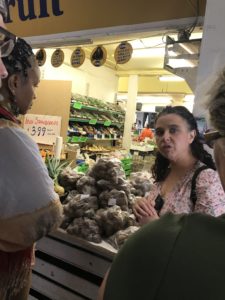
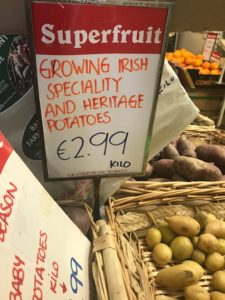
Lunch: The Farmgate Café
“Centuries old traditional, seasonal, regional, even ‘forgotten’ foods are at the core of the Farmgate ethos, and also form a visible link between the menu and the wonderful array of produce downstairs”.
PM Cork Butter Museum
Guided visit and demonstration at the museum celebrating one of Ireland’s great success stories – butter. Discover its heritage, growth in the 19th century and growth in international trade.
Free evening. Enjoy Cork
Saturday, May 31 | Local Markets: Local Food
Colin Sage, PhD and Regina Sexton, MS
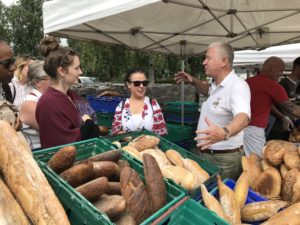
Our visits today provide a window into local food cultures beginning at the Midleton Saturday Market to observe and experience the direct connections with food growers and producers. Our lunch will be at Belvelly Smokehouse, one of the few traditional smokehouses remaining in the world where, for more than 25 years, Frank Hederman has smoked fish using a technique where fish is smoked hung over beachwood chips.
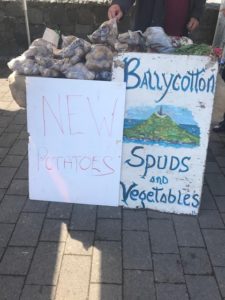
Free evening. Enjoy Cork
Sunday, June 1 | Free Day
Relax on your own or take a day trip on a tour bus to beautiful West Ireland sites like the Ring of Kerry, Dingle Bay, Cliffs of Moher, Blarney Castle.
Monday, June 2 | History of Food in Ireland
Our discussion with Regina focuses on The Great Irish Famine. The second half of the 18th century was the high point for the potato in Ireland. On the eve of the Great Famine, however, only one variety, the Lumper was almost the universal food of the poor. Their dangerous reliance not simply on one food, but on one variety of potato which was highly susceptible to potato blight made inevitable the dire consequences of this fungal disease in 1845.
Following the food history discussions, we will take a 30-minute train ride from Cork to Cobh, the emigration port for hundreds of thousands of Irish emigrants and the last port of call for the Titanic. Visit the Heritage Center (www.cobhheritage.com).
Dinner on your own in Cobh.
Tuesday, June 3 |Hunting Lodge, Gardens, & Cookery School
AM Fota House
The day starts with a guided tour of Fota House, its arboretum and Frameyard Kitchen Gardens. Fota House, originally a modest two-story hunting lodge belonging to the Smith-Barry family, was expanded in the 1820s into an elegant Regency style country house with over 70 rooms, ranging in size from the more modest servant rooms to the large and beautifully proportioned principal rooms. The development of Fota’s internationally recognized arboretum in the 1840s coincided with the great plant hunting expeditions around the world bringing back wonderful specimens from places such as the Orient, South America and the Pacific coast of northwest America. “Fota” is derived from the Irish “Fód te” meaning warm soil – perfect for the growing and cultivation of rare trees and exotic plants.

Lunch: The Bakestone Cafe at Fota House Dine al fresco and enjoy the views over Fota’s parklands. A variety of food, prepared daily, often using organic produce from Fota’s kitchen garden.
PM Ballymaloe Cookery School
Continue the day with a tour of the Ballymaloe Cookery School organic farm and gardens, followed by a cooking demonstration, and finishing with a hands on culinary experience and dinner.
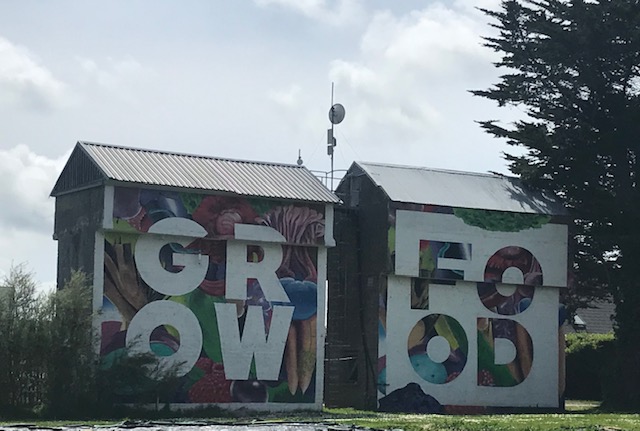
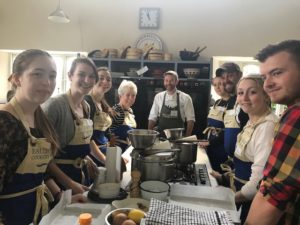
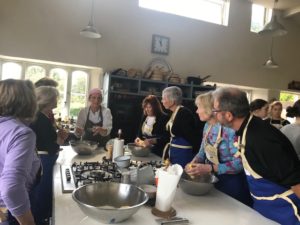
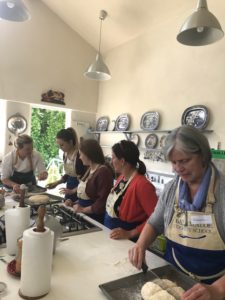
Wednesday, June 4 | APPLICATION IN ACTION: SUSTAINABILITY AND FARMING
Colin Sage, PhD
AM Glenilen Farm
Visit the farm of Alan and Val Kingston where they produce yogurt and other dairy products focused on sustainability and responsibility and dedicated to clean simple food bringing authentic farmhouse taste with honesty and transparency.
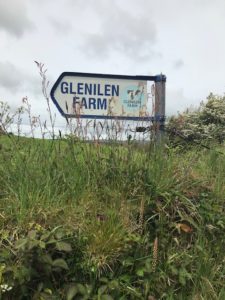
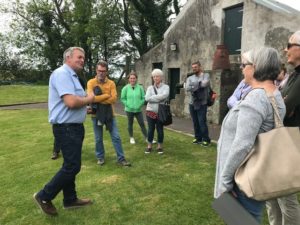
Lunch at Glenilen Farm.
PM Seaweed Foraging with Maria Kennedy in Union Cork, West Cork
Explore the pristine waters of West Cork with Maria Kennedy, foraging for seaweed and learning about the nutritional content of this super food from a garden that doesn’t need to be weeded. Taste dulse and carrigeen, types of seaweed that have traditionally been used in Irish kitchens.


Free evening. Enjoy Cork.
Thursday, June 5 | Making and Unmaking Meat
Colin Sage, PhD
Colin Sage will start our day with a discussion about the climate impact of producing animal protein and plant protein. Then we are off to see how a vegetable grower and restauranteur are working together to provide a de-meatification culinary experience. Travel by bus to Oysterhaven to visit Gort nah Ain, the farm of Lucy and Ultan Walsh. Ultan, an organic vegetable grower will provide a tour of his high tunnels during which he and Denis Cotter, award-winning author and proprietor of Paradiso, an award-winning vegetarian restaurant in Cork, will explain their collaboration between the vegetable grower and restaurant owner. Continue the conversation with Ultan and Denis while enjoying lunch that Lucy prepares with vegetables from the gardens.
Farewell Dinner at Paradiso
Dinner at Paradiso, an iconic institution in the Cork dining scene and the wider Irish food culture featuring the innovative and groundbreaking vegetable cuisine of Denis Cotter, is the perfect place for a fond farewell to the many delicious food experiences in the culinary capital of Ireland.
Friday, June 6 | Departure
June 17 – 27
Tues June 17 | Arrive in Cork. Check into UCC accommodations
Wed June 18 | University College Cork orientation. Program overview.
Thurs June 19 | Food, Culinary, and Dietary Patterns in Ireland.
Fri June 20 | English Market. Farmgate. Butter Museum.
Sat June 21| Midleton Market. Frank Hedeman salmon smokery
Sun June 22 | Free day
Mon June 23 | History of Food in Ireland. Cobh Heritage Museum.
Tues June 24 | Fota House and Ballymaloe Cookery School.
Wed June 25 | Sustainability and Farming. Glenilen Dairy and Seaweed Foraging.
Thurs June 26 | Climate Impact on Animal Protein Production. Vegetable farm. Farewell dinner.
Fri June 27| Departure
Tuesday, June 17 | Arrive in Cork. Check into University College Cork accommodations.
Wednesday, June 18 | University College Cork
Colin Sage, PhD and Regina Sexton, MS
Welcome, campus tour and program overview. Lunch at UCC Main Restaurant. Discussion about UCC food service and visit to Water Fall Farm, vegetable grower for UCC.
Thursday, June 19 | Food, Culinary, and Dietary Patterns in Ireland.
Food and culinary historian, Regina Sexton will begin with a discussion about Ireland’s rich agriculture and related food history. She will connect the history with today’s growth of artisan food producers, well-known chefs and regional food markets that are sustaining Cork’s culinary culture in the food capital of Ireland.

Discussion with Colin Sage on two related topics — what we eat has a significant impact on the global environment and the challenges today on creating a sustainable food system achieved through both technology-based changes to agricultural practices and consumer-food-choice changes that represent sustainable eating. How we will feed the world is an arena with competing visions of technological solutions and sustainable development principles.
Lunch on your own.
PM Cork Community Gardens
Join Maria Young, a member of the Cork Food Policy Council and Green Spaces for Health who coordinates the Togher Community Garden – one of 29 community growing spaces in Cork city, for a discussion about the Cork City Community Garden sites where planters, large polytunnel and seed beds are overflowing with vibrant vegetables, herbs, flowers, and fruit bushes weighed down with ripe produce, and the people living in the community around the garden, who learn how to plant, weed, harvest, cook, and eat what they grow.

Free evening. Enjoy Cork
Friday, June 20 | English Market. Farmgate. Butter Museum.
Regina Sexton will lead us through the English Market, Ireland’s most renowned covered market. Opened in 1788, it is one of the oldest local markets in the world and remains a bastion of Cork’s food traditions.


Lunch: The Farmgate Café
“Centuries old traditional, seasonal, regional, even ‘forgotten’ foods are at the core of the Farmgate ethos, and also form a visible link between the menu and the wonderful array of produce downstairs”.
PM Cork Butter Museum
Guided visit and demonstration at the museum celebrating one of Ireland’s great success stories – butter. Discover its heritage, growth in the 19th century and growth in international trade.
Free evening. Enjoy Cork
Saturday, June 21 | Local Markets: Local Food
Colin Sage, PhD and Regina Sexton, MS

Our visits today provide a window into local food cultures beginning at the Midleton Saturday Market to observe and experience the direct connections with food growers and producers. Our lunch will be at Belvelly Smokehouse, one of the few traditional smokehouses remaining in the world where, for more than 25 years, Frank Hederman has smoked fish using a technique where fish is smoked hung over beachwood chips.

Free evening. Enjoy Cork
Sunday, June 22 | Free Day
Relax on your own or take a day trip on a tour bus to beautiful West Ireland sites like the Ring of Kerry, Dingle Bay, Cliffs of Moher, Blarney Castle.
Monday, June 23 | History of Food in Ireland
Our discussion with Regina focuses on The Great Irish Famine. The second half of the 18th century was the high point for the potato in Ireland. On the eve of the Great Famine, however, only one variety, the Lumper was almost the universal food of the poor. Their dangerous reliance not simply on one food, but on one variety of potato which was highly susceptible to potato blight made inevitable the dire consequences of this fungal disease in 1845.
Following the food history discussions, we will take a 30-minute train ride from Cork to Cobh, the emigration port for hundreds of thousands of Irish emigrants and the last port of call for the Titanic. Visit the Heritage Center (www.cobhheritage.com).
Dinner on your own in Cobh.
Tuesday, June 24 |Hunting Lodge, Gardens, & Cookery School
AM Fota House
The day starts with a guided tour of Fota House, its arboretum and Frameyard Kitchen Gardens. Fota House, originally a modest two-story hunting lodge belonging to the Smith-Barry family, was expanded in the 1820s into an elegant Regency style country house with over 70 rooms, ranging in size from the more modest servant rooms to the large and beautifully proportioned principal rooms. The development of Fota’s internationally recognized arboretum in the 1840s coincided with the great plant hunting expeditions around the world bringing back wonderful specimens from places such as the Orient, South America and the Pacific coast of northwest America. “Fota” is derived from the Irish “Fód te” meaning warm soil – perfect for the growing and cultivation of rare trees and exotic plants.

Lunch: The Bakestone Cafe at Fota House Dine al fresco and enjoy the views over Fota’s parklands. A variety of food, prepared daily, often using organic produce from Fota’s kitchen garden.
PM Ballymaloe Cookery School
Continue the day with a tour of the Ballymaloe Cookery School organic farm and gardens, followed by a cooking demonstration, and finishing with a hands on culinary experience and dinner.




Wednesday, June 25 | APPLICATION IN ACTION: SUSTAINABILITY AND FARMING
Colin Sage, PhD
AM Glenilen Farm
Visit the farm of Alan and Val Kingston where they produce yogurt and other dairy products focused on sustainability and responsibility and dedicated to clean simple food bringing authentic farmhouse taste with honesty and transparency.


Lunch at Glenilen Farm.
PM Seaweed Foraging with Maria Kennedy in Union Cork, West Cork
Explore the pristine waters of West Cork with Maria Kennedy, foraging for seaweed and learning about the nutritional content of this super food from a garden that doesn’t need to be weeded. Taste dulse and carrigeen, types of seaweed that have traditionally been used in Irish kitchens.


Free evening. Enjoy Cork.
Thursday, June 26 | Making and Unmaking Meat
Colin Sage, PhD
Colin Sage will start our day with a discussion about the climate impact of producing animal protein and plant protein. Then we are off to see how a vegetable grower and restauranteur are working together to provide a de-meatification culinary experience. Travel by bus to Oysterhaven to visit Gort nah Ain, the farm of Lucy and Ultan Walsh. Ultan, an organic vegetable grower will provide a tour of his high tunnels during which he and Denis Cotter, award-winning author and proprietor of Paradiso, an award-winning vegetarian restaurant in Cork, will explain their collaboration between the vegetable grower and restaurant owner. Continue the conversation with Ultan and Denis while enjoying lunch that Lucy prepares with vegetables from the gardens.
Farewell Dinner at Paradiso
Dinner at Paradiso, an iconic institution in the Cork dining scene and the wider Irish food culture featuring the innovative and groundbreaking vegetable cuisine of Denis Cotter, is the perfect place for a fond farewell to the many delicious food experiences in the culinary capital of Ireland.
Friday, June 27 | Departure
University College Cork Faculty
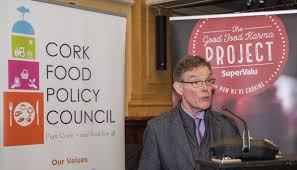
Dr Sage retired in 2019 from his position as Senior Lecturer in the Department of Geography, School of the Human Environment at University College Cork. His research interests are food systems, environmental policy and civic initiatives for social change. He is the author of Environment and Food (Routledge, 2012) and the co-editor of Food Transgressions: Making sense of contemporary food politics (Ashgate, 2014). Dr Sage has published more than 50 peer-reviewed journal articles and book chapters and delivered more than 70 keynote lectures and conference papers. He developed and served as chair of the Cork Food Policy Council.
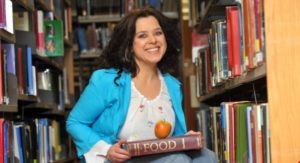
Regina Sexton is a Lecturer on food history at University College Cork. She is a food historian, food writer, broadcaster and cook. Her research interests include food and identity, food and tradition and food in the Irish country house. For over 25 years, she has conducted research and published widely at academic and popular levels in the area of Irish food and culinary history. Regina holds a certificate in Food and Wine from the Ballymaloe Cookery School. She has worked as a food history consultant with Bord Bia, Teagasc, Fáilte Ireland, RTÉ and the Irish Heritage Trust and as an historical food stylist for a number of television productions. Regina is also a member of the judging panel for Food and Wine’s annual food and wine awards.
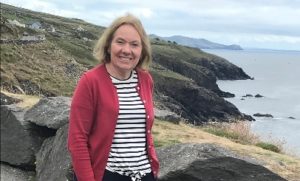
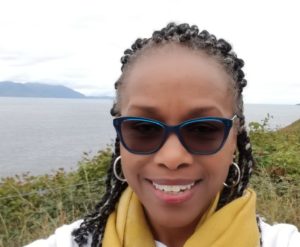
You could call it the luck of the Irish (Ann has family roots in Ireland) that an introduction by a University College Cork (UCC) professor, presenting at a conference with Ann in Florence, Italy brought Ann to Cork, Ireland to connect with UCC faculty colleagues, Colin Sage and Regina Sexton, and to create a total immersion into the food culture of Ireland today. As dietitian nutritionists, Le Greta and Ann value the expertise that Colin and Regina bring to the foodcultureology Ireland program from their extensive research on the continuing evolution of food production and consumption and its impact on our environment as well as their personal relationships with local food producers.
Registration
PROGRAM FEE $3400
Program fee is land price only. Fee does not include airfare to/from Cork, Ireland. Fee includes:
- Presentations by University College Cork faculty experts, local artisans, producers, chefs
- Cooking class
- 10 nights’ accommodations at University College Cork apartments in a private ensuite room in a 3-bedroom apartment with shared living room and kitchen with other program participants.
- Meals: 4 lunches, 2 dinners.
- If lunch or dinner is not listed on the program, this indicates free time on your own.
- Please indicate special dietary needs when you register.
Registration form
Please read Terms and Conditions and complete the 2025-Ireland-Registration-with-Terms-and-Conditions – June registration form. Signing the registration means you have read and understand the terms and conditions.
Payment options
Pay $500 by February 1, 2025 to save a space and make two payments of $1450 each by March 1 and April 1, 2025.
Make check payable to foodcultureology LLC and send with registration form to:

or
Click Here to Book Electronically (fees apply)
or
Payment can also be made through Zelle to transfer funds using phone number:
![]()
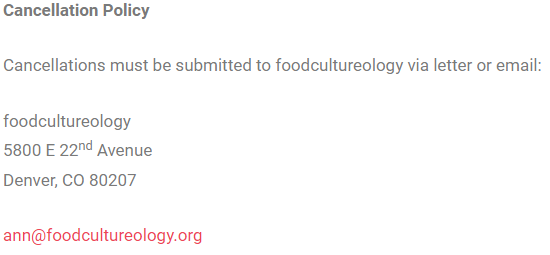
If cancellation is made before March 1, 2025 for any reason, deposits and program payments will be reimbursed in full. Between March 1, 2025 and April 1, 2025, 30% of the deposit and of any program payment will be refunded. After April 1, 2025, no refund is possible.
We understand that emergencies of all nature do arise, however there are no exceptions to our cancellation policy. We strongly urge you to purchase trip insurance to cover you for this possibility.
Please contact us with questions or advice about:
- Making flight reservations to Cork
- Level of physical activity
- Currency exchange
